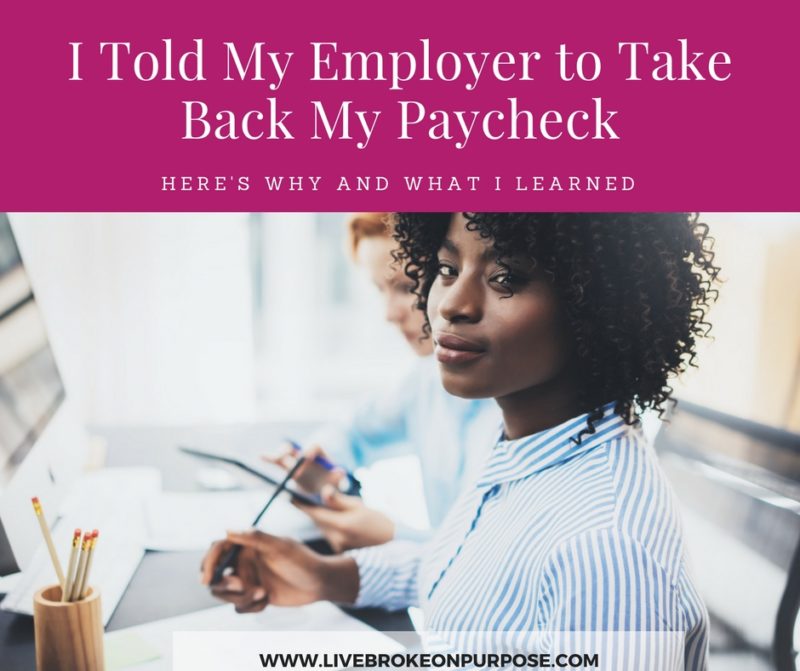
I told my employer to take back my paycheck. Yes, you read that correctly. I told my employer to take back the money that I’d been paid. If you like the Facebook page, then you heard me tell this story on my Facebook Live broadcast. If you didn’t get a chance to watch it here’s what you missed. You see, two years ago I would have never been able to utter those words from my mouth, and I want to share with you four important lessons that can be learned from this particular situation. First, let me start off by giving you the back story.
[ad name=”HTML”]Backstory:
Now that I’ve graduated and I’m staying on to finish work in the lab I can no longer be paid as a “student” and must be paid as a tech or a post doc. This means an increase of about $20,000 per year (which is great for me). I was told my increase would come with my July payment. Meaning the payment, I received from June would still be what I was previously getting as a student. Unbeknownst to me and several others, this was a completely wrong and payroll neglected to inform anyone of our wrongness until it was too late. It turns out; I was supposed to receive my increase with my June payment and to remedy this I would be getting retro pay.
Now that you’re all caught up let’s get into the what had happened and what I learned. At the end of July, I received my paycheck (we get paid once a month) and immediately noticed that something was wrong. My gross pay was over $7000, and I netted ~$5300, and I’m nowhere near being on that level yet. I say yet because I speak things into existence. My normal gross pay should be around $3950 for the month. This was confirmed by an email from someone in administration telling me that I’d been overpaid, and instead of receiving retro pay for the amount they didn’t pay me in June they gave me another full paycheck. So, basically, they paid me twice. It was a mistake, I understood, and I asked them to let me know how much I should return.
A week went by…
Finally, on Thursday of the next week, I received an email asking me to return $2197, which equates to the student salary I received in June. My reply to them was “I can’t do that.” If I did give them back $2197, then I would be the one losing money, not them.
Here’s Why.
- When I was overpaid/double paid, whatever you want to call it; It put me in a higher tax bracket.
- Anything extra that I was paid had been snatched up by all forms of taxes that come out of my check.
- I couldn’t give them what I didn’t have.
Upon explaining the reasons why I could not give them that amount I was told that they weren’t liable for the taxes and that I would possibly get them back next year. I was told this by two different people! I was even told…
“we don’t refund taxes, so I don’t know what you want us to do…”
Here’s problem number one: No one cared that the mistake occurred on their end, they just wanted their money. I wanted to give them their money, but I also wanted it to be fair.
After going back and forth with payroll, I was finally fed up with the whole thing, so I just asked them to take the money back. This shocked them because it’s not every day someone asks you to take back a paycheck. I repeated it. “Just take the payment back by doing a Payroll Reversal and then reissue me the correct amount.” Since the payment was made via direct deposit, they had the capability to do so. This is how the conversation went.
Them: “You know that means you have to give back everything.”
Me: I’m aware
Them: It comes out immediately.
Me: Okay.
Them: Can you cover it? You won’t get repaid until the next Friday.
Me: Yes, that’s what emergency funds are for.
The Four Lessons I Learned From This Situation
- In this situation, my Emergency Fund gave me an option. Instead of having to suck up their answer and lose money as a result of their error. I was able to take money from our emergency fund to cover me while they sorted things out. My emergency fund stepped in and had my back and allowed me to make an unstressed decision.
- There’s no excuse for you not to be saving money. Even though we had enough in our emergency fund to cover this “situation.” It still made me feel uneasy, and I asked myself if what we had was actually enough. There is no standard amount of money to have in your emergency fund, but what you do have should allow you to sleep comfortably at night. I realized that what we had didn’t make me feel comfortable anymore and so I realized that we would need to beef it up.
- Advocate for yourself when no one else will. In this situation I had two people in two different departments tell me that I was just going to have to deal with the fact that taxes had taken the extra money. They didn’t say “let’s see what we can do?” or “give us time to figure it out,” they said, “you owe us this, when can you pay it back?” When all this was going on, I was becoming very irritated as like anyone I don’t like my money to be messed with, but I had to stay cool, calm, and collected and advocate for myself. Most people are intimidated when it comes to money conversations. People start throwing out numbers and percentages, and you want to shut down. If you don’t understand, go to someone that does, explain the situation and have them come with you to talk it through. Remember the easiest fix isn’t always going to be the smartest or the cheapest.
- Don’t wait for an emergency to start building an emergency fund. We were lucky this time but had this occurred two years ago we would have had to eat the loss or ask one of our parents for money. This brings me back to your emergency fund having your back. It can turn a stressful emergency into a simple nuisance.
Remember, you have power over your money and situations. An Emergency Fund and a Budget are going to be the backbones of any good financial plan. When has your emergency fund had your back? Share your stories in the comments below.



